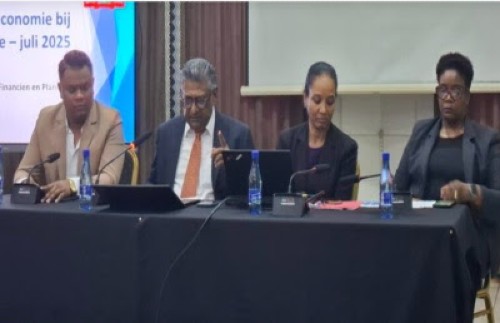PARAMARIBO, Suriname - Outgoing Finance and Planning Minister, Stanley Raghoebarsing, is calling for a further reduction in subsidies, warning that “expenditures are spiraling out of control."
 Outgoing Finance and Planning Minister, Stanley Raghoebarsing, second from left, at Monday’s news conferenceSubsidies and transfers are already higher than we budgeted for this year. If subsidies don’t decrease, it will put pressure on government finances,” Raghoebarsing told a news conference.
Outgoing Finance and Planning Minister, Stanley Raghoebarsing, second from left, at Monday’s news conferenceSubsidies and transfers are already higher than we budgeted for this year. If subsidies don’t decrease, it will put pressure on government finances,” Raghoebarsing told a news conference.
He told reporters that while “subsidies have been reduced significantly during this term of office, but they should have been reduced even further”.
Raghoebarsing questioned how is it possible that subsidies to the Energy Companies Suriname (EBS) are higher than those for healthcare, saying he country’s revenues, such as taxes, are running smoothly, but that “expenditures are spiraling out of control”.
The outgoing finance minister cited as an example, the payment to the Kenny Foundation which provides assistance to families in need by donating essential household items.
“As long as the relevant ministry hasn’t processed the receipts, the organisation will not receive any funding,” he said, expressing dismay that when a payment is delayed, the Ministry of Finance is automatically blamed.
Raghoebarsing told reporters that although Suriname has made progress on several macroeconomic fronts, the government’s debt service capacity remains a serious concern.
Raghoebarsing, who presented the current state of affairs based on nine macro indicators for the period 2020 to June 2025, said that the government is now raising more money, the exchange rate has remained relatively stable after three years, inflation has fallen, import coverage is ample, and international reserves are well above the norm.
He said that while the economy is also showing growth, Suriname is bound by agreements with creditors until 2050, although rescheduling makes repayments somewhat bearable.
A major bottleneck remains government debt, which stood at 121 per cent pf gross domestic product (GDP) in 2020, but has since fallen to 84 percent, remaining well above the international standard of 60 per cent.
A more worrying development is the government’s primary balance, a measure of its repayment capacity. This balance was minus 10 per cent in 2020, climbing to a peak of 1.4 per cent in 2023 during the programme with the International Monetary Fund (IMF), before falling back to 0.3 percent last year.
After the IMF programme ended, the balance fell back to minus 7.8 per cent.
According to Raghoebarsing, a serious deficit in government finances is expected in November. He said this gap has arisen due to the withdrawal of IMF support, telling reporters that serious consideration should be given to a possible second IMF programme.


